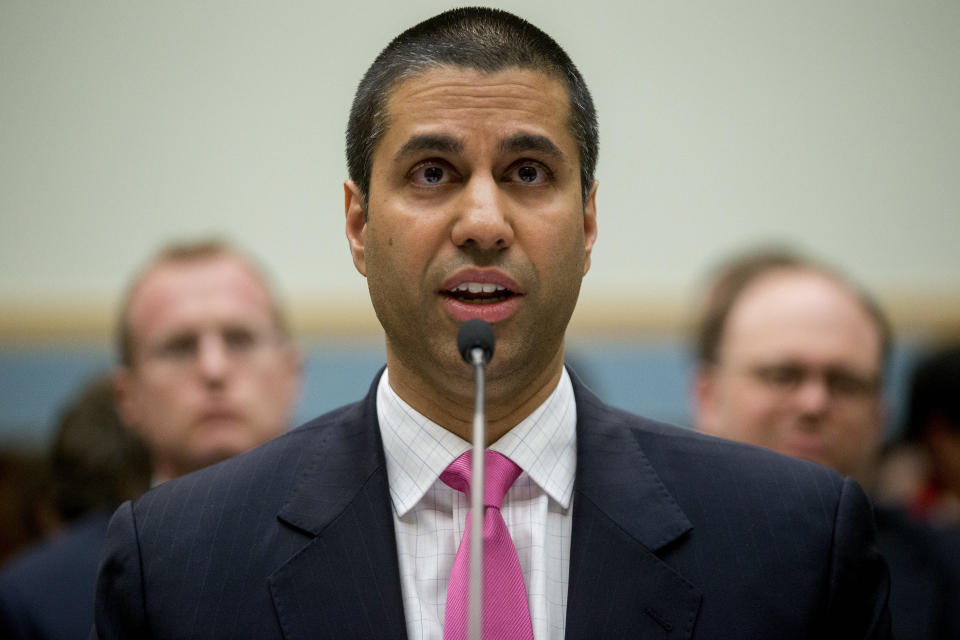How Eliminating Net Neutrality Will Change Your Experience on the Internet
The Federal Communications Commission (FCC) announced Tuesday that it plans to dismantle net neutrality regulations on internet providers, in one of several attempted reversals of the Obama-era policy.
FCC chief Ajit Pai, who previously worked for Communications before President Donald Trump appointed him to his role in January, said that the commission will vote to rescind the open internet rules on Dec. 14. “Today, I’m proposing to repeal the heavy-handed Internet regulations imposed by the Obama Administration and to return to the light-touch framework under which the Internet developed and thrived before 2015,” Pai wrote on Twitter Tuesday. (Trump reconfirmed Pai for a five year term in October.)
But what does net neutrality mean and how will it affect your Internet use if regulations are reversed? Here’s what you need to know right now.
What is net neutrality?
This term has been kicking around for several years, but most people struggle to define it.
When net neutrality is enforced, as it is right now, all internet service providers must allow equal access to apps and content, regardless of the source. If it were not enforced, your internet service provider could make it harder for you to access parts of the internet at its own discretion.
For a while it was a running joke that people knew net neutrality was important, but struggled to describe it. Back in 2015 (in the era of the dress debate), Saturday Night Live did a sketch that hinged on none of the invited guests -- all people who made a living on the web -- understanding how these net neutrality policies would work.
John Oliver broke it down in 2014 on his show Last Week Tonight and again in May of this year, when the FCC announced that it would be accepting comments on the new net neutrality rules.
"’The Internet is the repository of all human knowledge -- and goats singing Taylor Swift songs,’ said John Oliver on Last Week Tonight, rejoicing in the fact that the Internet is an incredible place,” wrote Time reporter Melissa Locker when the below clip first aired. “However, according to Oliver, that is threatened by the Trump administration's decision to roll back protections for net neutrality.”
What will the internet look like without net neutrality?
Without the assurance of net neutrality, large internet companies could favor their own business interests. Telecom giants and Silicon Valley titans are likely to lobby lawmakers in the coming days and weeks, but for now, net neutrality could affect everything from internet speed to overall access.
Slower speeds
The elimination of net neutrality means that internet providers can carve up service into fast and slow lanes, charging more for higher speeds. could demand fees from , for example, in exchange for preferential treatment. (In response to the FCC plan, Netflix took to Twitter to show “strong support” for net neutrality.)
If content companies don't want to pay, internet service providers could make them so slow that they're unwatchable or even block access to competitors' sites.
The FCC is getting ready to overturn #NetNeutrality. If they succeed, ISPs will be able to split the net into packages. This means that you will no longer be able to pay one price to access any site you want. pic.twitter.com/vEkNxPmVlu
— Ro Khanna (@RoKhanna) November 21, 2017
Higher prices
Reversing net neutrality rules could cost more to binge your favorite shows on Netflix or Hulu, to play video games, send messages on social media, or even to watch porn. These fees will likely be absorbed by consumers. So those with wallets fat enough for the price hike will enjoy higher speeds, but lower income browsers will get only a limited view of what was once a more open and egalitarian web.
More choices (maybe)
The argument for eliminating net neutrality posits that less regulation will lead to more investment and more competition in the internet service provider sector. FCC Chairman Pai said in May that this could benefit consumers and increase the number of Americans with internet access.
The lack of competition in certain areas of the country means that greater choice for customers would be hard to achieve and the biggest beneficiaries of eliminating net neutrality will be the largest internet service providers.
This change would likely result in paying for bundles or packages to access to different parts of the web, a model similar to the one that has worked out so well for cable.
Which countries do not have net neutrality?
What’s happening in the U.S. isn’t without precedent.
In Portugal, there are no net neutrality rules and internet packages, like what’s described above, already exist. The other countries without net neutrality enforcement include Argentina, Belgium, Brazil, Canada, Chile, China, France, Israel, Italy, Japan, Netherlands, Russia, South Korea, and Slovenia.
See original article on Fortune.com
More from Fortune.com


